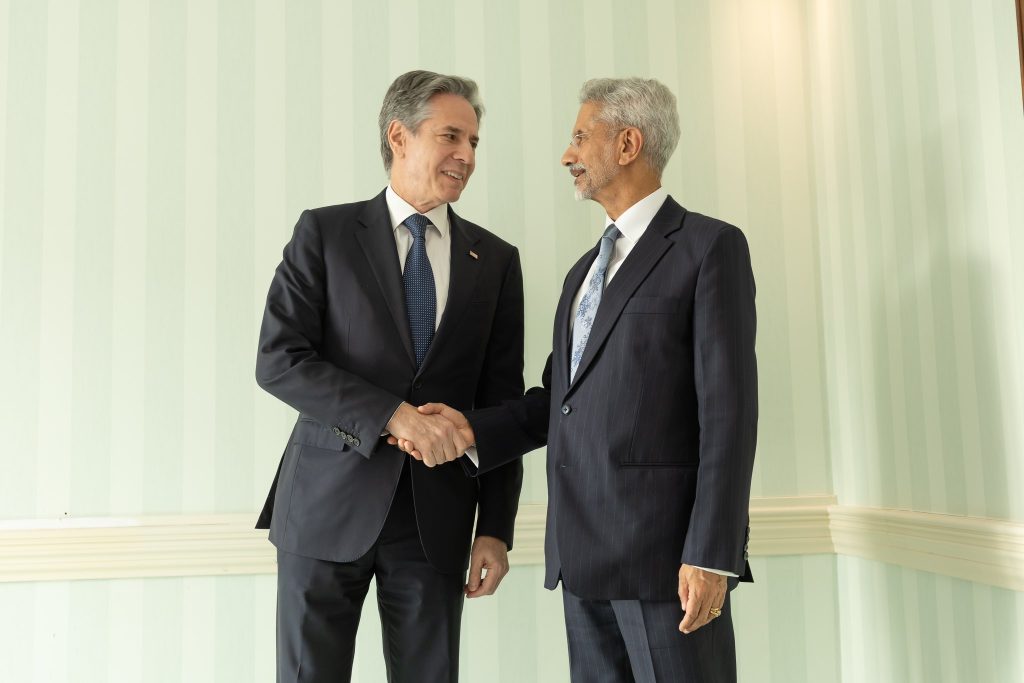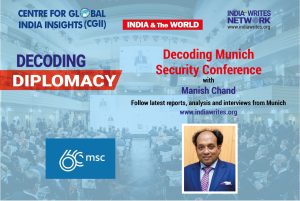
MUNICH: Amid growing concerns about Red Sea attacks and growing Chinese assertion in the maritime domain, India’s External Affairs Minister S. Jaishankar held talks with US Secretary of State Antony Blinken here that revolved around the fraught situation in West Asia, Ukraine and the Indo-Pacific.
The two foreign ministers met on the sidelines of the Munich Security Conference on February 17 amid emerging friction points in India-US ties over India’s alleged role in the foiled attempt to assassinate Khalistani terrorist Hardeep Singh Nijjar.
According to US state department spokesperson Matthew Miller, Secretary Blinken and External Affairs Minister Jaishankar discussed the need to ensure freedom of navigation in the Red Sea.”
“Secretary Blinken highlighted that the respective U.S. and Indian approaches to maritime security in the Red Sea are mutually reinforcing and play important roles in safeguarding economic stability in the region. The Secretary and External Affairs Minister also discussed ongoing work to ensure lasting peace and security in the Middle East,” he added.
“We’re working closely on a whole host of vital priorities that are making a difference in the lives of people in India and people in the United States: increasing mutual prosperity, advancing democracy and human rights, addressing climate change, upholding together the rules-based international order,” an official release by the US State Department quoted Blinken as saying further.
Besides Blinken, Jaishankar also held talks with his counterparts from several countries, including Canada’s FM Melanie Joly, German Foreign Minister Annalena Baerbock, United Kingdom Foreign Secretary David Cameron, European Union foreign policy chief Josep Borrell and Greece’s Minister of National Defense Nikos Dendias.
The three-day Munich Security Conference kicked off on February 16 with dozens of heads of state/government and foreign ministers in attendance. The conference began with scene-setting remarks by UN Secretary General Antonio Guterres, which stressed on the need for creating an inclusive and rules-based order. The global order is not working for anyone anymore.
In a speech at the Munich Security Conference, US Vice-President Kamala Harris underscored the US’ commitment to global leadership amid growing concerns in Europe about the US turning isolationist under a potential Trump presidency.

“These are questions the American people must also ask ourselves: whether it is in America’s interest to continue to engage with the world, or to turn inward. Whether it is in our interest to defend longstanding rules and norms that have provided for unprecedented peace and prosperity, or to allow them to be trampled,” said Ms Harris. Whether it is in America’s interest to fight for democracy or to accept the rise of dictators. And whether it is in America’s interest to continue to work in lockstep with our allies and partners or go it alone, said the Indian-origin vice-president.
(Manish Chand, is Founder and Editor-in-Chief, India Writes Network and Director, Centre for Global India Insights, a think tank focused on global affairs. He is in Munich to observe, analyse and interpret the Munich Security Conference.)
Author Profile

- Manish Chand is Founder and Editor-in-Chief of India Writes Network (www.indiawrites.org) and India and World, a pioneering magazine focused on international affairs. He is CEO, Centre for Global India Insights, an India-based think tank focused on global affairs.
Latest entries
 India and the WorldFebruary 27, 2026Modi visit: India-Israel partnership enters a new era
India and the WorldFebruary 27, 2026Modi visit: India-Israel partnership enters a new era India and the WorldFebruary 24, 2026Unravelling Modi’s Israel journey: What to expect
India and the WorldFebruary 24, 2026Unravelling Modi’s Israel journey: What to expect India and the WorldFebruary 17, 2026South-by-South: Focus on people-centric solutions at India AI summit
India and the WorldFebruary 17, 2026South-by-South: Focus on people-centric solutions at India AI summit India and the WorldFebruary 7, 2026Modi hails interim India-US trade deal, Goyal says no concessions made on agriculture
India and the WorldFebruary 7, 2026Modi hails interim India-US trade deal, Goyal says no concessions made on agriculture







